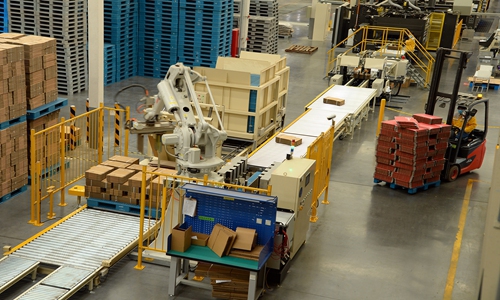HOME >> SOURCE
How can China cope with supply chain diversification?
Source:Global Times Published: 2020/4/9 21:18:40

A robot arm helps pack components in a traditional manufacturing facility in Taicang, East China's Jiangsu Province. Photo: cnsphotos
In a record economic stimulus package unveiled on Tuesday, Japan has reportedly set aside $2.2 billion to help its manufacturers move production out of China in pursuit of supply chain diversification. If anything, Japan's attempt to reduce its industrial dependency on China may presage the beginning of the COVID-19 impact on global supply chains, a trend we need to pay close attention to and take seriously.Objectively speaking, the $2.2 billion economic incentive is quite limited compared to the cost of shifting Japanese manufacturers out of China. So it remains to be seen how many Japanese companies will actually make the move due to the new policy.
Still, the pursuit of supply chain diversification - especially after the disruptive impact of the virus on the production chain - deserves attention. China's exports to Japan plummeted in February, resulting in a temporary shortage of essential parts among Japanese manufacturers.
Moreover, Japan's push to diversify its supply chain away from China may be just the beginning of a larger trend, and could be followed by similar policies from the US, South Korea and other key trading partners of China in the future. Regardless of whether such moves will be interpreted as anti-globalization or protectionism, it is likely inevitable that multinational companies will be increasingly inclined to seek supply chain diversification to reduce their reliance on one region.
In this sense, the coronavirus pandemic may serve as the most important turning point for China's industrial chain development since its accession to the WTO. Although multiple factors may determine that no other country can completely replace China's role in the global supply chain, an industrial transfer tendency is still worth our attention.
The whole world was caught off guard by the pandemic, meaning it will take time for any potential industrial transfer to take place. And China has no time to waste in planning and preparing for the change.
First, China could make full use of its market and production capacity advantages to retain its industrial chain. China is the only country that has all industrial categories listed in the United Nations industrial classification, contributing 30 percent of global manufacturing. And greater openness will make its business environment more attractive to multinationals, which will be crucial to protecting the local industrial chain. Second, China could improve its production support capabilities by cultivating industrial chain clusters, which will strengthen companies' resilience to "black swan" incidents.
Posted in: GT VOICE